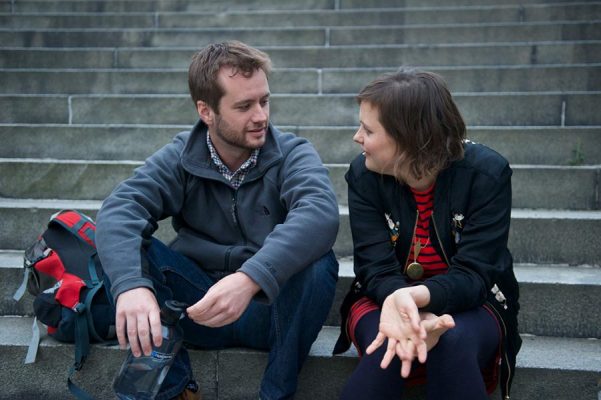For a certain demographic, much of Super November will feel comfortingly familiar. Filmed in and around Glasgow, it focuses on a small group of thirty-something friends navigating romance, friendship and employment while trying to pay their rent and get on with life amidst political turmoil. What won’t feel so recognisable is the dystopian twist things take in the film’s second act, which make it a very unusual, but interesting piece of work.
Josie Long, who also writes the film, stars as the central character: a somewhat irresponsible (even annoying) protagonist engrossed in a new relationship with the charming Mikey (Sean Biggerstaff), sometimes to the detriment of her friendships. While down-to-earth comedy and ‘normal’ life is at the fore of the narrative, the political backdrop gradually arouses suspicion. Newspaper headlines are captured in lingering shots and banter between characters often turns to politicians, social values and parliament. As the film progresses, it becomes clearer that the state of the nation and abrupt societal changes – curfews and a militant anti-immigration movement – is pressing more and more on the characters’ day-to-day lives. Ultimately, the plot’s focus shifts towards more politically-driven events.
What’s unusual, though, is that the film never becomes morose or takes itself too seriously. Whilst Josie faces eviction and the prospect of fleeing the city, the humour remains and the characters still seem more concerned with their love lives and friendships than anything else. It seems like this is deliberate, presenting us with the suggestion that people’s interpersonal connections and perhaps trivial concerns don’t always dissipate in the wake of political upheaval and that we are remarkably adept at change.
It does feel a shame, though, that Super November doesn’t fully tackle its undercurrents of governmental control and themes of oppression. It takes us to an alternative reality where a coalition government is imposing radical changes on society, but then doesn’t explore this much further. The short running time reflects this and leaves us with the impression that we didn’t really probe this interesting film-world too deeply.
However, it is more than competent in its key areas: the dialogue is believable and funny; the acting is suitably comedic (with a standout supporting role from Janey Godley as Josie’s irate library colleague); and the cinematography presents a realistic world we recognise. There isn’t much dynamism though. Despite the chaos into which we are told the country has dissolved, there’s never much of a visceral sense of conflict or impending disaster. We only ever roll along, enjoying the camaraderie of the central trio, knowing everything will be work out in the end. Again, this may be a purposeful comment on our attitudes towards crucial impending political situations, yet it still feels like a wasted opportunity to really probe the effects of such radical right-wing changes.
